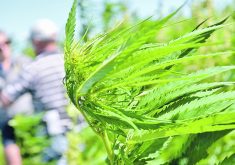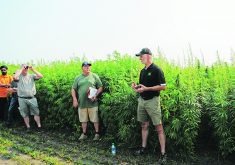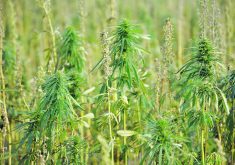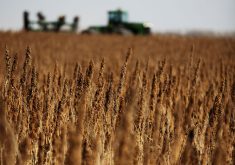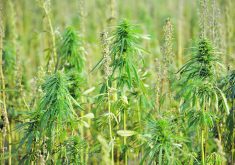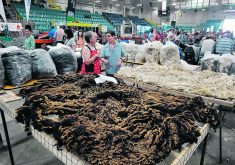Leaders of Canada’s hemp trade have longed talked about ‘whole crop utilization’, or using the seed, fibre, leaves and flowers of the hemp plant.
Till now, hemp processors have struggled to develop an industry around the fibre. Harvesting the flowers or leaves to manufacture medicinal products is illegal in Canada.
Charles Holmes is determined to change all that.
Holmes plans to open a plant in Nisku, Alta., that will handle and process the whole crop, producing products for the food, fibre and nutraceutical markets.
Read Also

Farming Smarter receives financial boost from Alberta government for potato research
Farming Smarter near Lethbridge got a boost to its research equipment, thanks to the Alberta government’s increase in funding for research associations.
“We’re going to take stuff off that industrial hemp plant and use it the best we can,” said Holmes, chief executive officer of Hempco, a public company based in Burnaby, B.C., that sells bulk hempseed and produces hemp-based foods under the brand name PlanetHemp.
“It’s a superior nutrition source. It’s a superior fibre source and it’s also got a medicinal aspect to it that’s incomparable…. We’re all in. We believe it’s going to grow.”
Holmes and his team, which includes his sisters Angela and Symentha, are installing hemp-processing equipment in a 56,000 sq. ft. building south of Edmonton.
They chose the location because of its proximity to hemp production in Alberta and they needed a centralized facility for offices, manufacturing and a warehouse.
Holmes hoped the plant would be running in June, but opening in the fall looks more likely.
Regardless, Hempco has big ambitions for its Nisku plant.
A company news release from April said the plant would process the following:
- 5,000 tons per year of hemp seed and produce 2,000 tons of hemp nut.
- 20,000 tons per year of hemp fibre processing capability creating 5,000 tons of hemp fibre. and 15,000 tons of hurds and shivs.
- 2,000 tons per year of industrial hemp leaf and flowers, producing 20 tons of low THC cannabinoids (CBD).
Cannabinoids are compounds that can be extracted from hemp flowers and plant tissue. Evidence suggests that CBD products can be used for pain relief, anti-inflammatory and anti-seizure treatments.
However, Health Canada prohibits the harvest of plant flowers and leaves.
Holmes and industry leaders are lobbying for changes to that regulation and hope it will be part of the federal government’s new policy for the legalization of marijuana.
Russ Crawford, Canadian Hemp Trade Alliance (CHTA) president, said unlocking the potential of CBD could transform Canada’s hemp industry
“My gut tells me there’s going to be more value coming out of industrial hemp from the cannabinoids than the food and the fibre combined,” Crawford said last fall. “There is a medicinal application for this that could be global in nature.”
Crawford and CHTA reps have travelled to Ottawa to make their case to federal politicians, including Bill Blair, parliamentary secretary to the Minister of Justice and the leader of the government’s mission to legalize marijuana.
“I can share with you that he (Blair) has a very clear understanding of hemp and the difference between the hemp and marijuana plants,” Crawford said. “So we’re optimistic that the regulations will reduce as we go forward.”
Holmes said it’s absurd that industrial hemp is still under the jurisdiction of Health Canada, which regulates its production in Canada.
He said it should be treated the same as any other crop.
“We’re not far away. The bottom line is that industrial hemp should be in the ag department (not Health Canada),” Holmes said.
“If I can have four marijuana plants that I can smoke and get high, in my backyard, why can’t I have four million (hemp plants) that produce no THC?”
The industry continues to wait for a decision from Ottawa. In the meantime Holmes is moving ahead with new products.
In March, Hempco and its PlanetHemp brand launched a CBD and Hemp Seed Oil product in the United Kingdom.
“Organic hempseed oil is the base and the (CBD) concentrate is added to it,” Holmes said.
Hempco is also exporting hempseed to South Korea, where consumers are looking for alternatives to traditional protein and oil products.
On its website, Hempco said it has a $9 million hempseed contract with a Korean distributor. But competition in the market has become “furious” because of cheap product from China and Eastern Europe.






